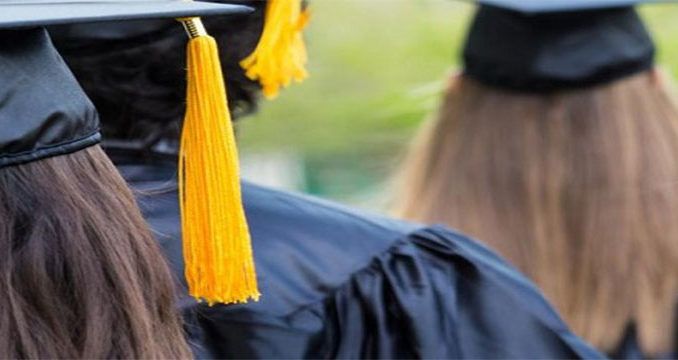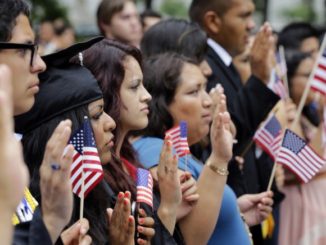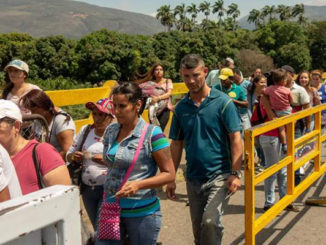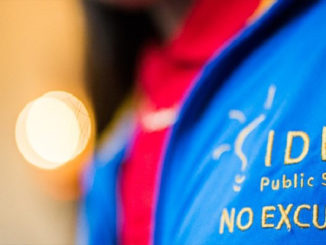
by Jenny Muñiz
Heeding a Tweet-invitation from the youth-led organization United We Dream, I headed down to Capitol Hill to join a DACA rally on the eve of this month’s government shutdown. When I arrived at the Hart Senate Office Building, the atmosphere was arresting. The building’s atriums and balconies were brimming with orange-clad Dreamers and their allies. They raised their fists and laid bare demands through chants and banners: “What do we want?” “Clean Dream Act!” “When do we want it?” “NOW!” Through all this, the symbolic butterfly wings clinging to their backs rustled in the wind of the chants. It was undeniable: for the few hours that they occupied the building, the spirit of democracy was palpable.
Certainly, I thought, lawmakers would draft legislative protections for these young undocumented immigrants. Of course, they would bar them from deportations and protect their ability to work legally—protections they stand to lose (and often have already lost) due to the President’s decision last September to strip DACA, or the Deferred Action for Childhood Arrivals, program. Even the lawmakers sitting in their offices, unsure of what to do, would be forced to listen and truly hear the stories of these young people. And while I chanted, I thought surely, they would appreciate and recognize the ways in which these young people have emerged of as exemplars of civic duty, strengthening our democracy through civic participation.
Unfortunately, my certainty was misguided. Despite 87 percent of the country supporting basic rights for Dreamers and their continuous and laudable efforts on Capitol Hill and across the country, lawmakers failed to craft a legislative fix following the government shutdown. Now, their fate hinges on congressional action by next week’s February 8 deadline. In the meantime, 122 DACA recipients lose their protected status every day and by the program’s final deadline of March 15th, that number will total 22,000.
In the midst of this, Dreamers will continue to defend their rights, but it is time for us to join them—and educators can be amongst their most powerful allies. Part of strengthening the DACA movement and other civil right movements—now and in the future—rests on educators’ commitment to exemplary civic education. Without this, the sad reality involves a generation that doesn’t understand civic participation, where young Dreamers are the exception, not the norm.
In fact, by most relevant measures, our country’s civic health is waning. Our voter turnout lags behind other developed nations; the majority of adults exhibit an alarming dearth of basic civic knowledge; we have lost faith in the effectiveness of contacting our representatives; and even young people are experiencing difficulties identifying misinformation on the internet. But perhaps the most alarming sign of our deteriorating civic health is our growing inability to engage in informed debate. The lack of political participation paired with little civic knowledge is calling into question the viability of our experiment in self-governance.
This should come as no surprise, considering schools have largely abandoned their civic mission. Gone are the days when high school students had to take three courses in civics and government. Instead, the time public schools spend on civic lessons has been replaced by an emphasis on teaching (and testing) “core subjects”. And when educators do undertake the task of teaching civics, their curriculum can be vastly insufficient. Civic lessons too often end with knowledge building, due to a prioritization of rote memorization over exercises that build active civic participation muscles.
But this system doesn’t work because our democracy requires us to have the ability and willingness to participate in it. Take the actions of Dreamers, for example. Though their plight has only recently come to national attention, Dreamers have been working for years to secure a path toward citizenship for themselves and their families. They have shouldered a heavy load, burdening themselves with our collective civic responsibility by petitioning, canvassing, testifying, joining advocacy groups, and forging coalitions. Dreamers have shown themselves to be engaged and active members of society, capable of taking effective action. And notably, many of these activities have been spearheaded by the youngest and most vulnerable among us.
In fact, the most active participants in our democracy are currently those who are forced into participation by personal circumstances. Dreamers are standing up for Dreamers. Black Lives Matter activists are standing up for black men and women murdered by police. Women are standing up for women. But we need to come together and participate for each other, and that has to start at school.
Our public schools should seek to ensure that every child is developing the capacities requisite for civic participation. And we can only accomplish a more highly democratic and participatory system by re-committing to civics teaching that goes beyond instilling bits of knowledge and engenders two more fundamental things: skills and dispositions. All students should learn foundational democratic skills, including the abilities to analyze important information, develop informed positions on contemporary issues, and discuss those positions productively, even with those who disagree.
Equally important, a quality civic education should empower students to exercise their right to vote, to contact their representatives, and to protest when they feel strongly enough. Beyond these basic skills, a quality civic education will give students a sense of efficacy and civic duty, ensuring they have the disposition to utilize their civic skills. Through this, our students can realize our democratic ideals of social justice, unity, equality, and diversity.
We have an opportunity here to ensure a generation of people willing and able to engage in our much-cherished practice of democracy. But to do so, we need to undertake two difficult steps. First, we need to acknowledge the value of our most civically engaged—the Dreamers—by ensuring that 700,000 DACA recipients and 3.6 million of other undocumented immigrants brought here as children are fully accepted. Second, we need to implement quality civic education for American youth, so that they might share the Dreamers’ tremendous aptitude for self-government. Doing so just might save our democracy.
Jenny Muñiz is a Public Policy Fellow for New America’s Education Policy program.



